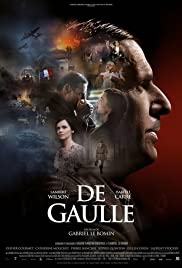
DE GAULLE
France, 2020, 108 minutes, Colour.
Lambert Wilson, Isabelle Carre, Olivier Gourmet, Catherine Mouchet, Gilles Cohen, Tim Hudson, Philippe Laudenbach, Clemence Hittin.
Directed by Gabriel le Bomin.
This portrait of Charles de Gaulle was made for release on the 80th anniversary of De Gaulle’s going to England, his broadcast on the BBC in June 1940, the beginnings of the Resistance and the Free France movement that culminated in the defeat of the Nazi invasion.
The film presupposes audience knowledge of France at the time of the attack on France in Paris, the relationships between France and Britain, the role of Winston Churchill, the role of Charles de Gaulle. So, for those interested in these film explorations of World War II and leadership, a fine recreation of the period, its tensions and danger.
There is a portrait of De Gaulle which emerges from the film, his military background, President Paul Reynaud promoting him to general and his becoming part of the French Cabinet, but also of De Gaulle as a person. There is his relationship with his wife, Yvonne (a sympathetic Isabelle Carre), his children, especially his youngest daughter, Anne, with a flashback to the difficulties of her birth, the parents concern, the opinions of the doctor, her being a Down Syndrome child – which led to a particular devotion to Anne from her parents.
On the political side, it is interesting to see the role of President Reynaud, decisive, indecisive, hesitant, influenced by his wife, trying to cope with the political opinions of the military, especially of national hero, Marechal Petain, acclaimed as the hero of Verdun, wanting to make peace with the invading Germans, an armistice. De Gaulle on the other hand, with a scene of his visiting the front with some devastations of defeat, not wanting to surrender, always wanting to fight back.
Audiences, especially those who have seen the many films about Churchill, will be interested in Tim Hudson’s version of the Prime Minister and his interactions with De Gaulle.
It would probably be fair to say that those not familiar with the characters and events may find this film something of a revelation about these episodes of World War II – but, on the other hand, they may not be caught up, characters and events seeming rather distant, political, psychological drama rather than war action.
- The status of Charles de Gaulle, military, Free France and the Resistance, his later political career? Audience knowledge of him? Appreciation of him? Critique?
- The focus on the months in 1940? In France, the German invasion, the political response, the military response? The role of the president? The military chiefs? Marechal Petain? The expectations of Germany winning, armistice and surrender? Or resistance and freedom? Audiences watching this drama in the light of what actually happened?
- France, 1940, the countryside, homes? Paris and political offices? The front and the devastation? The refugees on the road and the attacks and deaths? The difficulties of travel, train, on the road, ships from France? Bordeaux and the transfer of the government? The coast and Brest, refuge on the beach, the bombardment of the port?
- The portrait of de Gaulle, Lambert Wilson’s performance, appearance, screen presence? With his family, devotion to Yvonne, his children, the flashback to the birth of Anne, the congenital difficulties, whether she would live or not, the doctor’s opinions, Down Syndrome? The devotion of the parents to her as she grew up? Constant care? De Gaulle as a family man? The opening with the priest, Mass, receiving communion? His later going into the church to pray?
- His military background, going to the front, his war philosophy and tactics of attack? The hesitation of the generals? Fears? The president? The promotion? In cabinet? His advice, the confrontation with the cabinet members, the military hostile, his service under Petain, disagreeing with him? Mandel and the Jewish background?
- The president, the continued pressures, decisions, indecision, the influence of his wife, his supporting de Gaulle, the variety of meetings, the fall of Paris, the decision to move to Bordeaux? His resignation?
- Marechal Petain, the hero of Verdun? Capitalising on his reputation, his wanting to surrender, armistice, agreement, survival? Taking over? And the audience knowing of the Vichy government?
- De Gaulle, his visit to Churchill, audience knowledge of Churchill and his leadership, Britain 1940, Dunkirk, the Blitz? Anthony Eden and Foreign Minister? The cabinet meetings? Attitude towards France, towards Britain, the suggestion of some merger? The changing situation in France? De Gaulle, the meeting with the president, his return to England, his assistant going with him, finding accommodation?
- The background of De Gaulle and his broadcasts, carefully writing them, changes, the British Cabinet and hesitation, his reading his broadcast and its subsequent effect?
- The story of the family, at home, his urging them to move, the difficulties with Anne and her health, going to stay with relatives, the decision to move, going to Brest, at the beach, two Gaulle meeting his wife? The going to the port, the crowds, finding passage on the boat, the threats, other boats sinking, arrival in Britain, not sure where, the officials, the newspaper with the information about De Gaulle? The phone call, his going to meet them, reunited?
- The nightmare episode for Yvonne, imagining what would happen with the German invasion, the house, mayhem in the house, the dangers for her daughter, the soldiers cavorting on the beach, destruction?
- De Gaulle and his subsequent career, the Free French, the Resistance, France participating in the peace talks? De Gaulle as president of France?